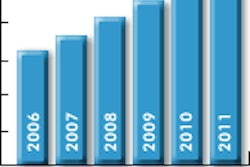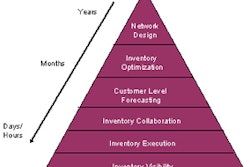Houston — January 18, 2007 — According to the results of EquaTerra's 4Q06 Outsourcing Pulse Surveys, there is positive but slow demand growth in the overall business process outsourcing (BPO) and IT outsourcing (ITO) markets. Forty-six percent of EquaTerra advisors indicated that demand levels were up for the quarter, but this represents a 13 percent decrease from 3Q06 and 4Q05.
Service providers citing "up" pipelines rose to 61 percent from 48 percent in 3Q06, but this is down from the 4Q05 level of 67 percent. These findings illustrate that overall outsourcing demand is generally growing, but at a slower pace than in previous years, and points toward slow market growth for the first half of 2007.
Stan Lepeak, EquaTerra's managing director of Research, noted, "The drivers behind this finding are continued BPO supplier capacity constraint, comparisons to historically high levels of demand, more multi-sourcing leading to — in some cases — smaller, less visible deals, and more prudent, sophisticated and selective buyers." But he also noted this does not signal a demise of the outsourcing industry, simply a multi-pronged market readjustment.
A major take-away from the 4Q06 Pulse Surveys is that, contrary to popular views and portrayals, the prevalence of outsourcing contract renegotiations, recompetes and restructurings are not a widespread sign of "deals gone bad" or the demise of the outsourcing industry. Rather, buyers, service providers and outsourcing advisors alike view them, in most cases, as a catalyst and opportunity for improving the deal. In fact, on a scale of 1-5, EquaTerra advisors cited nearly a "4" likelihood that incumbent service providers will retain the majority of the original business when an outsourcing contract is being renegotiated.
Said Lepeak, "The reality is, most outsourcing deals face periodic, and often ongoing, challenges the buyer and service provider ultimately resolve. Also, the large number of IT Outsourcing deals and comprehensive, early-adopter HR Outsourcing deals signed in the late 1990s and early 2000s are entering a natural phase of renewals and restructurings. And, in retrospect, some of the early multi-process HRO deals were not structured well for either the buyer or the provider. All these factors contribute to an increased level of renegotiations, recompetes and restructurings, but are not necessarily negative in reason or outcome."
Other key findings in the 4Q06 Pulse Surveys include:
- Outsourcing of non-traditional functions such as document and imaging services, legal processing, "knowledge process" outsourcing, and logistics services is on the rise, which signals an increase in both supply and demand
- A continuing increase in multi-provider sourcing that can benefit buyers if it allows them to engage the best service providers for each of the processes being outsourced, but can also be more complicated and expensive to manage than sole-sourcing
- Most buyers continue to underestimate the cost and complexity associated with performing outsourcing management and governance (OM/G) activities, and shortcomings in: 1) the staffing of the governance organization; 2) costs associated with the use of third-party services such as lawyers, advisors and benchmarking firms; and 3) the costs for software tools to support OM/G efforts are often one of the root causes for problems with outsourcing transitions and dissatisfaction with ongoing outsourcing












